
Plans to protect women by putting plainclothes police officers in nightclubs are bizarre, frightening and “spectacularly missing the point”, campaigners and charities have said.
The plans were outlined by the government as part of the steps it was taking to improve security and protect women from predatory offenders. Called Project Vigilant, the programme can involve officers attending areas around clubs and bars in plainclothes, along with increased police patrols as people leave at closing time.
Bryony Beynon, the managing director of the Good Night Out Campaign, said that the government’s plan was “pretty frightening”, and that it “feels like an increase in police intrusion into social spaces”.
Other steps unveiled by Downing Street include a doubling to £45m of the Safer Streets fund, which provides neighbourhood measures such as better lighting and CCTV.
“It feels like a real scattergun approach, which certainly looks like an attempt to distract from the rightful criticisms of the last week, particularly that kind of police response on Saturday,” Beynon said, referring to the policing of a vigil in memory of Sarah Everard on Clapham Common in London at the weekend.
She added that given what was known about how predators operated in licensed premises, one of the best ways for them to be challenged was when those who were being targeted felt “confident and able to name what is happening” and then felt empowered to reach out for support.
“The idea that undercover or plainclothes officers are somehow going to be a source of support just seems like very strange logic,” she said.
Downing Street also said ministers were committed to working with police forces and with police and crime commissioners to ensure the measures were more focused on preventing sexual violence. Boris Johnson said it could mean siting measures in parks and routes used by women on their walks home.
But the Labour MP Stella Creasy said that, while she would not oppose the plans, and any improvement to street lighting would be welcome, they largely missed the point.
“Sarah Everard was not on a night out, so the idea that putting plainclothes police officers in nightclubs is going to solve this problem doesn’t recognise that women get abused, assaulted, intimidated in all sorts of places,” she told BBC Radio 4’s Today programme on Tuesday.
“Ask women who’ve gone for a run recently in broad daylight in their parks about their experiences and you’ll realise some of the scale of the challenge. And what strikes me is that 80% of women report being sexually harassed in public spaces but, in those surveys, 90% of them say they never report it because they don’t believe anything will change.”
She called for misogyny to be made a hate crime “so that existing crimes like sexual harassment, abuse and intimidation can be reported and recorded as such, so we can build up patterns of where the problems are to help the police with the way in which they investigate these issues”.
Student groups campaigning against gendered violence share similar concerns to the plans.
It Happens Here was formed in 2012 by a group of students in Oxford, with the aim of addressing sexual violence within a university setting. Since the group was established, others have formed at universities including those in Newcastle and Coventry.
Alessandra Peters, a policy officer at It Happens Here Oxford, said the general feeling was that plainclothes officers were “not a deterrent to harassment and assault”.
Instead she said things that were beneficial were “nightclubs having CCTV in all areas, offering lids on drinks to help prevent drink spiking, and public transport infrastructure which will support women getting home safely,” she said. “That isn’t even thinking about more cultural shifts that need to happen.”
Prof Zara Quigg, an academic at Liverpool John Moores University, whose research includes sexual violence and nightlife health, said that although any efforts to enhance safety in nightlife was welcomed, these measures “don’t really address the underlying causes of sexual violence.”
“They don’t consider that the majority of women regularly experience sexual violence in nightlife, predominantly from other male nightlife users,” she said, “So it’s not just about predatory individuals who may frequent the night-time economy to purposely implement sexual violence – actually there is a broader societal issue of sexual violence often being the norm in the night-time economy.”
A spokesperson from the Centre for Women’s Justice said the plans were bizarre, particularly at a time when “women’s faith in the police has been so damaged by recent events”.
They said: “Many women will now be quite rightly asking: ‘But who will protect me from the plainclothes officer?’ Undercover policing has recently been exposed as providing an opportunity for police officers to abuse their cover in forming inappropriate sexual contact with women. This initiative needs much more informed consideration.”












